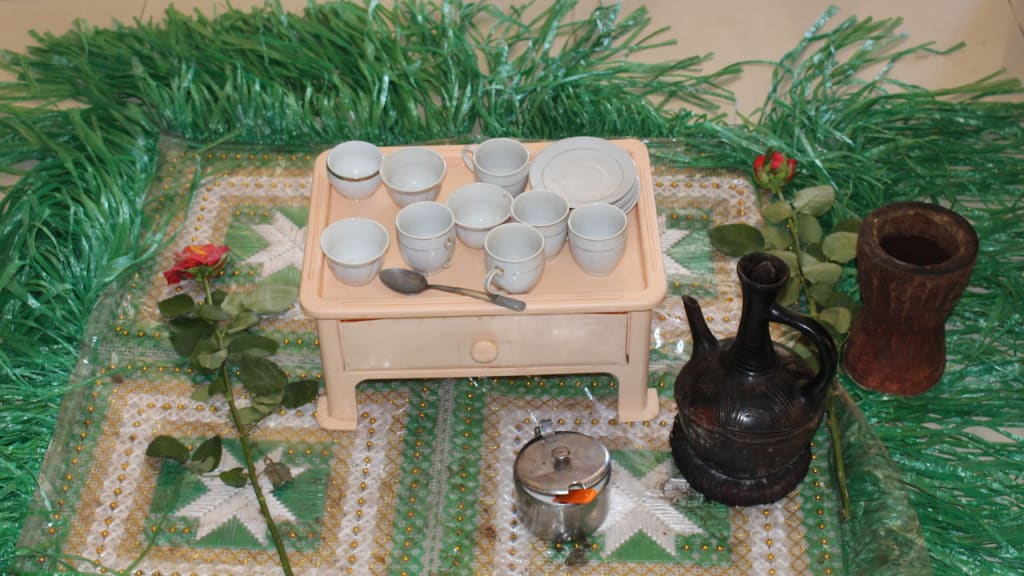Coffee That Deserves a Ceremony
A Look at an Ethiopian Tradition

Any Starbucks fans in the house? What's your favorite drink there? Maybe it's a cappuccino that they whip up, maybe it's a mocha, or a latte. Perhaps you like yours served black without all of the extras. Let's see how well we know our Starbucks history. When did the store first open its doors? According to Starbucks' website, their first store opened just under fifty years ago in Seattle's Pike Place Market. The company grew to fifty-five stores by 1989 and went on to have over twenty-two thousand stores as of 2015. That's a lot of coffee!
Maybe you are not a Starbucks fan per se, but a coffee drinker? USA Today claimed in 2013, that "about 83 percent of adults" in America are coffee drinkers. How much do you know about your coffee? Where does it originate? Some presume Ethiopia to be the birthplace of coffee (or "bunna" in Amharic, Ethiopian language). How does all of this information about Americans compare to Ethiopians? Are they coffee drinkers like us?
CNN tells us Ethiopia exported $528 million of arabica coffee, and that love of coffee dates back to the 10th century, before the dream of Starbucks was a twinkle in its founder's eye. About 80 percent of Ethiopians base their income on coffee and the majority of Ethiopians consume up to four cups daily. It's no surprise when any coffee drinker, Starbucks fan or not, can agree that hand ground coffee tastes better than any other coffee made by machine; especially those like myself who have actually traveled to Ethiopia, and have tasted and seen this coffee that deserves a ceremony.
Ethiopia is notoriously known for traditional coffee ceremonies. With coffee beans ground by hand, Ethiopian coffee is by far one of the best tasting coffees you are to experience, sure to ruin every Starbucks in America. While there is the ability to sip from a cup at a local stop with friends, or perhaps enjoy a brew while reading the paper in populous, more developed places like the capital Addis Ababa, coffee is generally served in the form of a ceremony.
The ceremony consists of gathering around with your nearest friends while one prepares each drink. Beans are roasted right in front of you and once the beans are finished roasting, they are ground by hand. The smell delights the senses as the barista helps the smoke to waft right to your nostrils. Incense may also be burned, adding to the delightful aroma.
Soon, hot coffee is poured into tiny cups from the jebena, an Ethiopian coffee pot. Dressed in traditional white garb and a heart full of hospitality, your Habesha (which is just another name for Ethopian; it's what they call themselves) barista may serve you such special treats such as popcorn or chick peas, and perhaps a chunk of bread. The coffee can come with sugar or milk if available upon request, but as sugar is about as available as water and power in Ethiopia, sometimes the coffee is served black. Once all are served their food and their drinks, a prayer may be said, and then you get lost in conversation about the day, enjoying the camaraderie of good company.
If one ever gets the chance to travel to Ethiopia, coffee ceremonies are certainly a part of Ethiopian tradition that is easy to fall in love with. Travel to the country and drinking Ethiopian coffee is certainly worth ruining your Starbucks relationship. If the coffee isn't amazing enough, the children who greet you in the street with all their love and laughter will be sure to win your heart and retain a chunk of it before you leave. So pack your bags, bring your friends, pull up a seat, and drink up the warmth of Ethiopia's culture.
About the Creator
Enjoyed the story? Support the Creator.
Subscribe for free to receive all their stories in your feed. You could also pledge your support or give them a one-off tip, letting them know you appreciate their work.






Comments
There are no comments for this story
Be the first to respond and start the conversation.